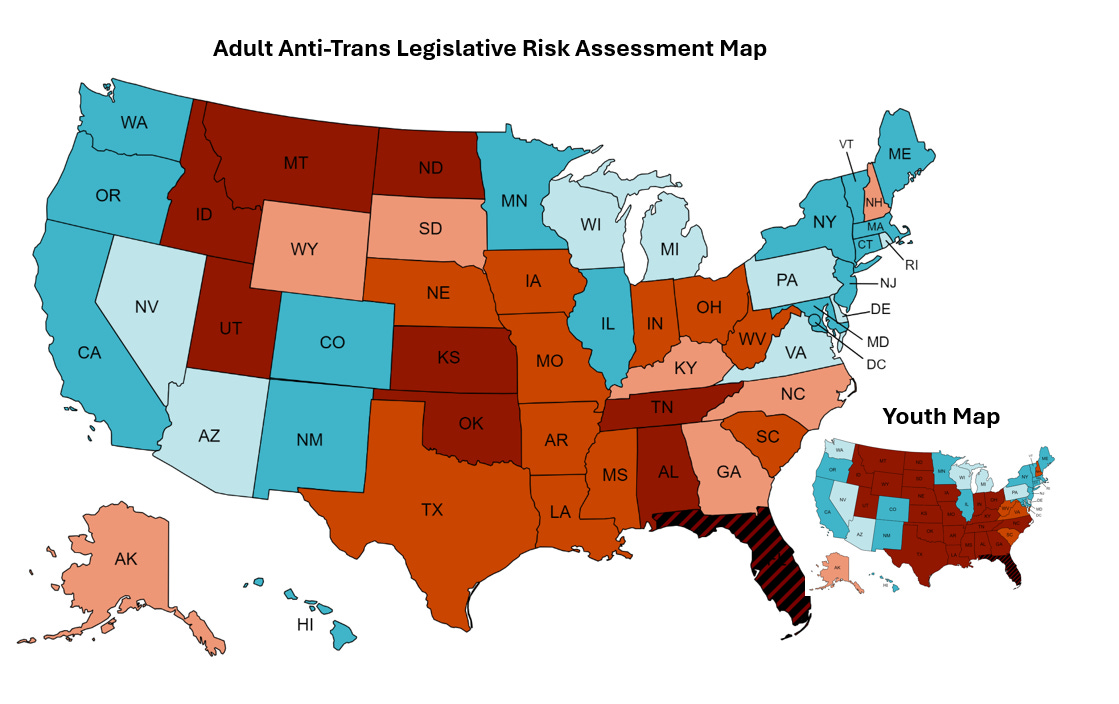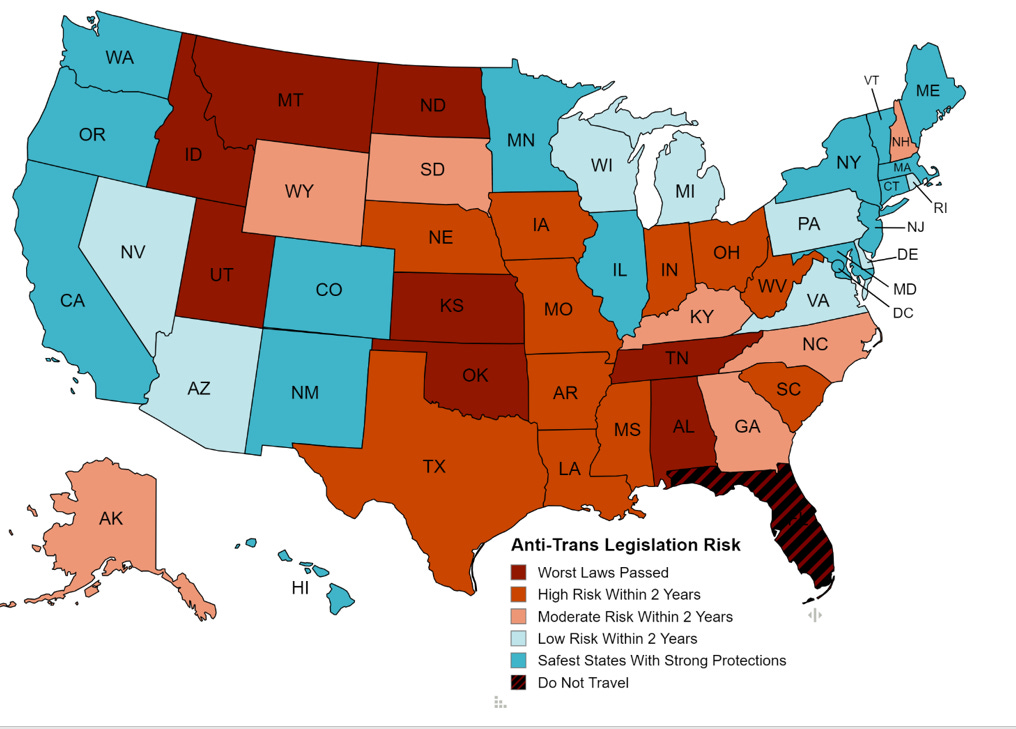Short summary of updates: Passage of a transgender sanctuary bill in Maine places it among the safest states with the best protections for transgender people for both youth and adults. Several anti-trans bills that have passed in Idaho raise its risk for transgender adults; that risk was already at its highest level for transgender youth. In Alabama, passage of a college bathroom ban and extreme Don’t Say Gay law moves it into the most restrictive as well.

About The Map
I have tracked anti-transgender legislation for 5 years @erininthemorn on Twitter and TikTok. Every day, I’ve gotten messages from worried people wondering how they are supposed to assess their risk of staying in their home state. The messages range from parents of trans youth wondering if their children will be taken from them to trans teachers wondering if their jobs will be safe in coming years. Sometimes people just want to know if there is a safer state they can move to nearby.
I created the legislative risk map specifically to help answer that question. Now more than ever, it is a question that needs answering for so many transgender people facing forced medical detransition, arrests for using the bathroom, bans on the use of our names, pronouns, and identification documents, and many other curtailments of our rights to exist in public life.
In previous iterations of the map, the focus was entirely on the risk to transgender youth. When the map was first developed, bills targeting transgender youth were far more common. Unfortunately over the last year, the transgender youth map has lost all granularity, largely reducing to just two colors: red and blue, a set of states criminalizing trans youth and a set of states protecting them. You can still find this map at the end of the document, and it will be continually updated. The primary map of focus, though, will be the transgender adult map, as bills targeting trans adults have become far more common.
Methodology
The methodology used is primarily qualitative, with a scoring-rubric element for the worst bills. Part of the methodology is my own expert assessment of laws, of which I am well equipped to do. I have read all 550 bills that target trans people in America in 2023 and 520 so far in 2024. I have watched hundreds of hours of hearings on anti-trans legislation and am fully aware of all of the players nationally as well as where they are making their pushes against trans rights. I have followed the vote count and talk to activists on the ground in each state. I am looking at how similar states are moving in their legislative cycles. Lastly, I watch for statements by governors and bill drafts to see if the Republican party in various states seems to be pushing anti-trans legislation heavily - you can see many examples of such legislation in this newsletter.
In terms of actual laws, I keep a rubric of the various types of laws that target transgender people. For transgender youth, the most concerning laws are those that prohibit gender-affirming care and mandate detransition. Additionally, bathroom bans, laws that rigidly define sex as binary, and restrictions on social transition are other key factors that negatively impact a state's ranking. For transgender adults, the primary legislative concerns include adult gender affirming care bans, bathroom bans, prohibitions on drag specifically aimed at trans people and pride events, restrictions on changing birth certificates and drivers licenses, and laws that end legal recognition for trans people entirely. These factors play a significant role in how I assess and rank a state's legislative risk.
The Adult Trans Legislative Risk Assessment Map

This updated map delineates the legislative risks concerning laws aimed at transgender adults in the United States. States like Florida have eliminated 80% of all trans adult care, adults can be thrown in jail for using the bathroom of their gender identity, and trans people with correct gender markers on their drivers licenses can be charged with fraud. Multiple states have passed laws ending all legal recognition for trans people. As such, starting this year, adult risk levels for trans people will be tracked on its own map.
Moves in this update: Idaho (High Risk → Worst Laws), Alabama (High Risk → Worst Laws), Maine (Low Risk → Safest States)
- Summary of updates: There are three major moves in this latest update. Both Idaho and Alabama move into the most restrictive category. In Idaho, multiple anti-trans laws passed, including one law that bars all state funding for gender affirming care as well as state facilities from practicing gender affirming care; many hospitals receive state funding there. In Alabama, a “Don’t Say Gay or Trans” bill also applies a bathroom ban against transgender adults and has even been targeted at a transgender Space Camp employee. Meanwhile, Maine moves into the most protective category after legislators passed a sanctuary bill there in spite of bomb threats received by the state legislature.
Nationwide Risk: Moderate. Although energy around anti-trans legislation seems to have peaked, the 2024 election could put transgender rights under threat nationally.
Here are the categories:
- Do Not Travel (FL): The only state earning a “Do Not Travel” advisory is Florida. Florida has a law that allows for the arrest of transgender people for using bathrooms according to their gender identity and another policy targets transgender people’s drivers licenses. Florida has also put into effect a policy that says trans people “misrepresenting” their gender on their drivers license could be guilty of fraud. Local LGBTQ+ orgs as well as HRC have issued travel advisories for the state. This analysis likewise concurs with such a rating.
- The Worst States (AL, ID, KS, MT, OK, ND, TN, UT): These states have passed deeply troubling legislation targeting transgender adults in extremely harmful new ways. Kansas and Utah have bathroom bans for transgender adults. Alabama has also passed a Don’t Say Gay bill that includes a bathroom ban on college campuses. Many states, including Kansas, Montana, Oklahoma, and Tennessee, have gone so far as to legislatively erase transgender people, effectively removing any legal rights associated with their gender identities. Other states, such as Kansas, North Dakota, Oklahoma, and Tennessee, prohibit any changes to birth certificates, forcing trans people to out themselves when showing their documents. In Kansas, this law could even force individuals who have updated their driver's licenses and birth certificates to see their gender markers reverted. These states also could start targeting adult gender affirming care - Florida has already done so, banning 80% of such care. Idaho has an extreme ban on state funds for gender affirming care.
- High-Risk States (AR, IA, IN, LA, MO, MS, NE, OH, SC, TX, WV): All of these states have passed some anti-trans adult laws, but they haven't reached the same level of severity as the worst states. Missouri and West Virginia, for example, prohibit gender-affirming care for incarcerated adults as well as transgender youth and have seen new laws proposed this cycle going even further. Nebraska’s governor has issued an executive order ending legal recognition of trans people. Additionally, some of these states, including Arkansas, have laws that permit the refusal of medical care to LGBTQ+ individuals on religious grounds. Iowa may soon require trans people to have special markers on their birth certificates identifying them as trans. Although each of these states has laws targeting transgender adults, none have done so to the extent of the worst states.
- Moderate-Risk States (AK, GA, KY, NC, NH, SD, WY): These states have either passed one or two laws aimed at transgender adults or have enacted multiple laws targeting transgender youth, or are advancing negative laws quickly. For states focusing on trans youth, history shows they are more likely to introduce anti-trans legislation for adults in subsequent years. All of these states are under Republican control, either through supermajorities in the legislature or Republican governorships. Many have enacted "Don't Say Gay" provisions, which frequently result in the banning of transgender teachers - in Georgia, for instance, a teacher was fired for merely reading a book with a character that could vaguely be interpreted as transgender. Additionally, many have passed religious refusal rights bills. However, most of these states have either not yet ventured into anti-trans adult legislation or have only passed milder forms of such laws.
- Low-Risk States (AZ, DE, MI, NV, PA, RI, VA, WI): These states have largely refrained from targeting transgender adults, although they haven't taken extraordinary steps to protect adult transgender rights either. For example, Arizona and Virginia have enacted anti-trans policies affecting youth but, due to state-specific factors, appear unlikely to extend such policies to adults. Conversely, Michigan, and Nevada have enacted fairly robust non-discrimination policies but fall short in ensuring healthcare equity and providing protections for incarcerated transgender individuals. While these states generally offer a safer environment for transgender adults, they stop short of going the extra mile to make their jurisdictions unequivocally safe places to reside.
- Most Protective States (CA, CO, CT, DC, HI, IL, MA, MD, ME, MN, NJ, NM, NY, OR, VT, WA): These states have gone above and beyond in safeguarding the rights and well-being of transgender individuals, making them highly desirable places to live for those in search of security. States like Colorado, Hawaii, Maryland, and Washington have enacted comprehensive health insurance laws that cover facial hair removal and an expanded range of medical procedures. Each of these states offers refugee protections for individuals fleeing more repressive states with anti-trans laws. Care is not only supported but also enjoys legal reinforcement from the state, ensuring accessibility as long as such treatments remain lawful at the national level. These states are the most likely to counteract federal anti-trans regulations if faced with a Republican presidency.Please support my independent reporting and advocacy on transgender legislation by subscribing. You help me keep this going and keep people informed.Subscribed
The Youth Trans Legislative Risk Assessment Map

Very few states now occupy the middle ground in the realm of anti-trans legislation for transgender youth. Those marked in dark red have enacted bans on gender-affirming care for transgender youth, with many even mandating medical detransition for these young people. Conversely, states shown in dark blue have implemented refugee protection laws for trans youth seeking to escape the harsh legal environments of more restrictive states.
Moves in this update: Maine (Low Risk → Safest States)
- Summary of updates: The only shift this month for youth has been the state of Maine, which moved from the lowest risk level into the ranks of the safest states due to a passage of a transgender sanctuary/shield law protecting medical care from out of state prosecution. Several states do bear watching, however: South Carolina could pass a gender affirming care ban at any time, for example. Similarly, Colorado and California bear watching over anti-trans ballot initiatives, which have not yet reached the threshold to go on the November ballot.
Nationwide Risk: Moderate. The 2024 election cycle remains a great threat towards transgender youth.
This article originally appeared on Erin in the Morning.








































































Charlie Kirk DID say stoning gay people was the 'perfect law' — and these other heinous quotes